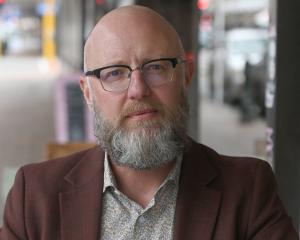
The Dunedin resident has spent 17 years struggling with endometriosis, a disease where uterine tissue grows outside the uterus, causing a range of symptoms from extreme menstrual pain to bowel problems and infertility.
The 28-year-old, now recovering after undergoing private surgery to treat her condition, says she is angry the healthcare system is failing those with the condition.
This International Endometriosis Awareness Month she is encouraging women to trust their pain and not let themselves be told they are imagining or exaggerating it.
Ever since her first period at age 11 caused her to end up in an after-hours doctors’ clinic being administered pain medication through a drip, she had struggled with her condition. It was also around this time constipation became a problem.
Having lived in Wellington, Hawke’s Bay, Christchurch, Palmerston North and Dunedin, she had gone through several district health boards.
"All of them said no to me having surgery," Mrs McRae said.
"I’ve been put on everything; I’ve tried almost every pill there is to try."
This ranged from Levlen — which came with "awful side effects"— to Ginette and Cerazette, and she had resisted pressure to have an Intra Uterine Device inserted.
"My endo, when we finally found it, was located in a place that was making even using a tampon painful. There was no way I was going to be able to have an IUD inserted."
She had been told she had a low pain threshold, or that her issues were caused by past trauma and were all in her head. However, she knew something was wrong, especially when she had the "terrifying" experience of passing out in a mall behind the locked door of a bathroom stall in 2017.
Finally, a Dunedin doctor took her seriously, and referred her to a gynaecologist.
When the gynaecologist declined surgery and offered yet another pill, she went for a second opinion.
"I had to finally say, I want to have babies and I don’t know if I’ll be able to because of the pain — that’s when I finally got taken seriously."
An initial surgery simply confirmed she did indeed have endometriosis, after which she was put on a waiting list for the more difficult removal surgery.
Two years passed, and she was still waiting.
An unexpected announcement by her grandmother resolved the situation: the problem had dragged on too long and she would pay for her granddaughter to have private surgery.
The surgeon found her condition worse than expected from the notes provided, at stage three of a total four.
"There was so much, and not just surface, it was quite deep."
As well as removing the endometriosis, the surgeon also took care of related issues, such as the removal of a Gartner's duct cyst, and a partial bowel resection.
The endometriosis had been impacting on her bowels, causing pain and constipation which she had simply been expected to live with, she said.
The surgery had gone well and she could already feel a big difference.
However, it also left her with concerns.
She had to miss school and later, work, had been managed out of jobs and been affected physically and mentally due to the inadequacy of the public system, she said.
"It makes me so angry that I had to wait 17 years and was basically gaslit by the system."
She speculated this could be due to a lack of training about the condition, or a bias against women, or a continuing taboo around menstrual issues.
"It could be a whole host of things, but it really breaks my heart I had to suffer for so long and it turns out this was not my fault."
Equally heartbreaking was that others were also suffering and would not necessarily have the money to pay for private surgery, she said.
Te Whatu Ora Health New Zealand (HNZ) did not comment on whether there were plans to change how the healthcare system treated endometriosis, but a spokesperson said in 2020 the Ministry of Health published the best practice guidance Diagnosis and Management of Endometriosis in New Zealand, developed by a taskforce of representatives.
The guidance aimed to support early diagnosis, and referral to secondary care gynaecological services were only advised if a patient had "uncontrolled symptoms" that did not respond to primary treatment options.
The establishment of HNZ provided an opportunity to build on work previously done, the spokesperson said.











